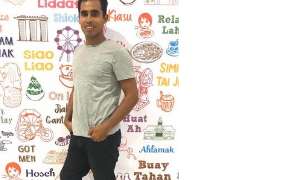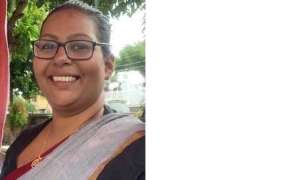
Jul 25 2020.
views 536“I was called anathaya (orphan), avajathakaya (illegitimate child), madame lamaya (child from the orphanage),” recalls Moses Akash De Silva, National Director of the Voice for Voiceless Foundation. There was only one reason for that – the birth certificate. Unlike in other birth certificates, his father’s details were just a dash. Having lived through this stigma and discrimination for over 30 years, himself and all other care-leavers were longing for change. After much begging and long-fought struggles, the Registrar General’s Department announced that the new birth certificate will not include the marital status of parents. Despite this announcement being a tiny victory, Akash says that they still have a long way to go.

A laughable document
“Care-leavers are youth that leave care homes,” he added. “The current system in our country is such that once you reach the age of 18 you are considered an adult so you no longer can be attached to a children’s home.” But they feel this pressure from the time they sit for their O/Ls. It was when he was going to face his O/Ls that he first saw his birth certificate. “I wanted to check with my friend and his birth certificate was complete. I then had to go to the post office to make the postal identity card and people there were looking at me in an odd way,” he recalled. In school, his birth certificate was a laughable material for the rest of his friends that he was subject to bullying and discrimination. As a result, a bright student who scored 7As out of eight subjects didn’t sit for his A/Ls. At 17, Akash then started a hotel school course and was employed at a hotel with no pay. He then shifted jobs to wash plates and do minor work at a factory. This is the plight of many other care-leavers in the country.

‘Probable birth certificate’ as an accepted alternative
But with a drive to make a change, Akash, Nimmu Kumari and two other care-leavers together with Generation Never Give Up that was established three years ago. exposed their challenges to the media. This programme was done with the support of SOS Children’s Villages. “It was quite challenging to show my birth certificate to the media,” he recalled. “It is the identity that society gives you as soon as you’re born. You’re labelled as a fatherless child. Other than removing the marital status of parents we also requested authorities to issue a birth certificate only with details of the child. But it should be a valid document. When we discussed with the Parliamentary Oversight Committee they said it could create problems pertaining to inheritance. The birth certificate is a mandatory document for your job interview and also when opening a bank account, applying for a passport etc. If you have a valid document only with your details you don’t have to carry an incomplete document. Most care-leavers don’t have bank accounts because of an incomplete birth certificate. I have faced all these issues. Recently we helped care-leavers during the pandemic but most of them didn’t have account numbers.”
He says a ‘probable birth certificate’ should be familiarized among all authorities. “Otherwise when we take it to them they ask what this piece of paper is. My parents leaving me was beyond my control but why should it affect the rest of our lives? We already face discrimination and these incomplete documents add fuel to the fire. There are talented children who can’t find a school because the marital status of parents section is incomplete in their birth certificate. School managements think that such a child would add a black mark to the reputation of the school. We have a Western system with archaic documents. Somebody has copy-pasted the laws without clearing out the grassroots level problems,” he added.
Although it was supposed to be implemented at the beginning of the year, changes in government and the pandemic outbreak had delayed the process. But it’s better late than never. Akash and his team consider it to be a small victory. It would only minimize discrimination and not eliminate it totally. Now it has raised a question of whether this would encourage couples living together. He responds to such doubts by saying that Sri Lankans should follow the culture and heritage and have children only if they are married. But times certainly have changed. He hopes that the probable birth certificate will soon be accepted as a valid document as the next step in this process and for that he requests the Ministry of Women and Child Affairs to take the lead.
Other challenges
Apart from the birth certificate, care-leavers don’t have a franchise since they don’t have a permanent residence. Akash, for example, has only voted thrice in his life and those were instances when he was residing at his Pastor’s house. They were also not given a Rs. 5000 allowance and Akash asks whether they shouldn’t be the first to have received the allowance since they are shelterless, jobless and are literally stranded in society. However, he had managed to raise funds and give away Rs. 5000 twice to around 150 care-leavers along with dry rations. This shows that change certainly is a long way ahead.
A benefit for children
According to the 2018 Annual Report, the Department of Probation and Child care services estimates over 11,000 children in care homes. Out of them, a majority leaves by the time they are 18. “Once they leave there are much vocational training and other skills development programmes organized by the provincial departments,” said Chandima Sigera, Commissioner of the Department. “These empower them to develop their skills in order to find job opportunities.”

Speaking about the removal of the marital status of parents in birth certificates, Ms Sigera further said that it will benefit children who have both parents but are not married. “It will lessen discrimination to an extent.”
A foundation step to change the over-conservative mindset
However, attorney-at-law and Founder of Child Protection Force, Milani Salpitikorala believes that a definite change of mindset is needed both in Colombo and out of Colombo. “From experience, we have an enormous amount of cases coming in with single mothers trying to convince and fight with the fathers of children, in order to get their names on birth certificates. On the other hand, we have the care-leavers whose parents are almost always unmarried. These children (now adults) have informed us of the difficulties and prejudices they face when being interviewed at schools and jobs. To frown upon such irrelevant matters is the Sri Lankan culture. By the government proactively taking such steps will definitely at least be the foundation steps of changing this over-conservative mindset.”
“We have had clients who have remained in abusive marriages for decades, only because they are ashamed of divorce. I do believe in the strength of the family unit, but what should be kept in mind is that a child will be better off with one happy parent rather than two parents who are violent at home.”
Responding to the question of minimizing discrimination she hopes that it will happen that way. “There are more single parents than we know and it is definitely not an easy job. I hope communities start assisting each other to bring up children instead of frowning upon single parents and parents who are having trouble with their children.”
Entities such as CPF are genuinely fighting for children’s rights. But how far can privately funded organisations go is a question. “The fact that it is private itself is the biggest challenge,” she added. “I have funded this myself for the past three years and just coming to think of it, we are doing a humongous service to the country and its Juvenile Justice System and we have absolutely no support from the government. There are many efforts on the part of the government and a lot of work spoken about by the large scale NGOs, but is this work actually seen in the village level or the grassroots level? We don’t see it happening. We work closely with people. We feel that most of the resources both service and financial are distributed at the top level, much unnecessary money spent on launches and events but just a small portion of it actually reaching the real work and the real people. This system needs a change of attitude as well.”
In her concluding remarks, she blamed the policymakers and government officials for completely concentrating on power and money. “There may be just one or two who are genuinely worried about Sri Lanka and her future. And if they are worried about Sri Lanka’s future, they need to protect our children as they are our biggest asset. The government should use the knowledge and expertise of expert Civil Society Organizations. They are an asset themselves. People need to leave their personal agendas at home and work for the betterment of this beautiful country before it goes down to the dumps. I feel we are heading that way if like-minded, educated people stay put in this mother country and work towards her betterment.”
0 Comments